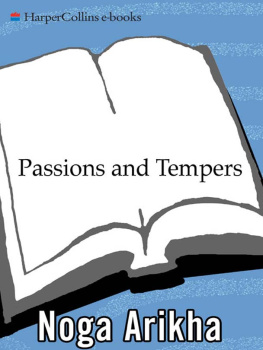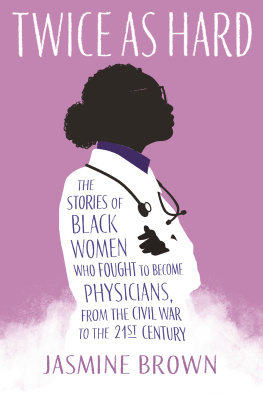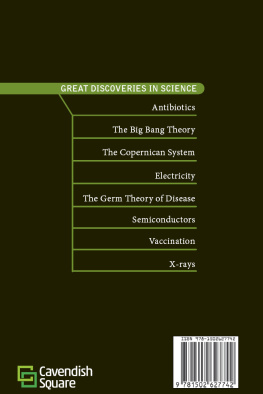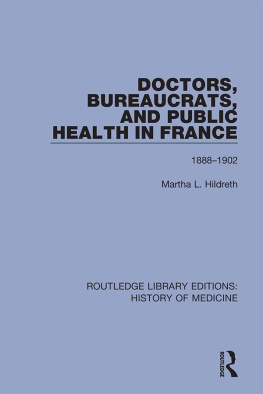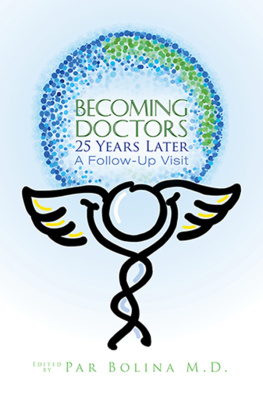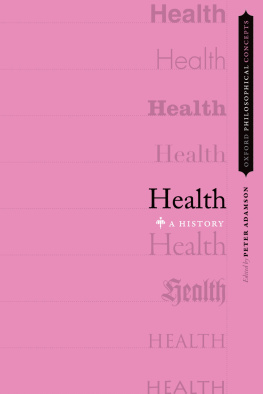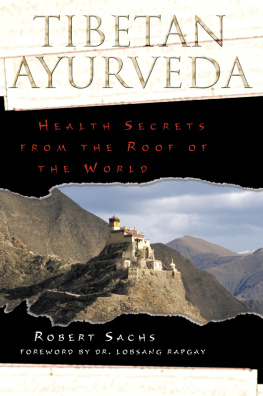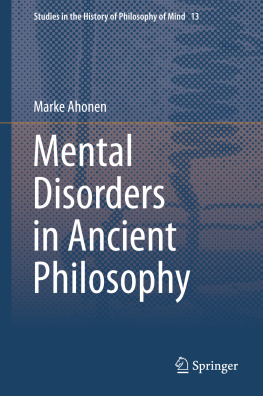Contents
Foundations: Ancient Insights
(Antiquity: Sixth Century BC to Second Century AD)
Cosmic Elements
Human Elements
Types, Temperaments, and Environments
Prescriptions and Priests
From Greece to Alexandria
The Naked Eye
The Breath of Life
Alexandrian Sects and Galenic Travels
Primordial Passions
Three Souls
Essences: The Classical Trail
(Eastern Middle Ages: Seventh to Twelfth Centuries)
Byzantium
The Arab Conquest
Hunayn ibn-Ishaq and the Translators
Divine Creation and Human Frailty
Religion and Emotion
New Departures
Persian Insights
Out of Spain
Remedies: Miraculous Medicine
(Western Middle Ages: Fifth to Fourteenth Centuries)
Faith and Healing
Scholasticism and Humoural Care
Old Convictions
The High and the Low
Outsiders
Bloody Treatments
Verbena, Olives, and Herbal Power
Apothecaries, Alchemists, and Amulets
Airs, Waters, Places, Diets
Fearful Epidemics
Life After Death
Harmonies: Renaissance Bodies and Melancholy Souls
(Renaissance: Fifteenth Century to Early Seventeenth Century)
Hypochondria at Court
The Black Sun
Mind, Matter, and Metaphysics
Cosmic Attunement
Musical Therapy
Artistic Astrology
Paracelsus and the Magic of Nature
Corpses, Books, and Reputations
Beauty Beneath the Skin
New Bodies, Old Science
Diagnosing Melancholy
Love-Maladies
Uterine Fury and Satyriasis
Anti-Melancholy Antidotes
Nature: Of Blood, Airs, and Reasons
(Scientific Revolution: Seventeenth Century)
New Science, Old Bodies
Campanellas Heavens and Galileos Revolutions
Atoms and Humours
From Spirits to Circulation
Harveys Blood
Cartesian Souls
Anti-Humours
Empiricism
Medical Secrets and Popular Healers
Transfusions and Confusions
Brain: Passions and Nerves
(The Making of Modernity: Seventeenth to Nineteenth Centuries)
Cartesian Humours
The Physiological Self
The Sensitive Soul
Introducing Neurologie
Enlightened Thinkers, Old-Fashioned Doctors, and the Embodied Mind
Of Mechanism and Vitalism
Nervous Juice
The Material Soul
Modern Humours
Mental Illness
Mesmerism
The Birth of Psychiatry
Brain Localization
Hypnosis, Hysterics, Neurosis
Science: Contemporary Humours
(Twentieth and Twenty-first Centuries)
The Neurological Self
The Pharmaceutical Self
Brain Images and Body Image
The Emotional Self
New Temperaments
Mind Over Matter
The Regimen Returns
Full Circle
T HIS BOOK owes its existence not only to thoughts and stories contained within other books, but also to friends, acquaintances, mentors, and chance encounters. I first discovered many of the books, especially those concerning the classical, medieval, and early modern worlds, in the Warburg Institute in London, where some years ago I conducted under the attentive supervision of Jill Kraye the doctoral work without which I would not have been able to conceive of a history of humours. Although much of this book was written in New York, it remains something of a Warburgian enterprise.
The actual seeds of this book were sown on a cold December day in 2001, in New York, over lunch with the philosopher Avishai Margalit, whose maieutic gifts led me to first formulate the idea. I am deeply grateful to him for that inspiring lunch, and for his subsequent encouragement. The project crystallized during a fellowship in 20022003 at the Italian Academy for Advanced Studies in America at Columbia University, whose director, David Freedberg, I thank for his generous hospitality and support, and for his invaluable friendship since then.
I am grateful to Leyla Selmi, who believed in the idea from the very beginning, and who was instrumental in helping me turn it into a book project. It took off thanks to the enthusiasm and hard work of Deirdre Mullane and the trust that Dan Halpern of Ecco put in it, as did Julia Serebrinsky, then editor there. Her successor, Emily Takoudes, has been a demanding, exceptionally attentive editor, and the manuscript was much improved under her guidance. Deirdre Mullane also helped me to undertake revisions, which benefited from the input of Jon Jackson.
Thanks to Alissa Quart for coming up with the titles final version, to Robert Martensen for his critical and detailed evaluation of the text, and to Edmund Fawcett for some sharp comments; to Elisabetta Mori for sharing her research on the fate of Isabella de Medici; and to Jay Weissberg for information on Mrs. Carleton. At the Warburg Institute, I owe thanks to its director Charles Hope; to Charles Burnett, the expert on Arabic medicine there, for bibliographical clues and for kindly correcting the chapter on this topic; to Ian Jones, for logistical assistance; and to Rembrandt Duits and Paul Taylor, for help with images.
I was able to discuss the work in progress on a number of occasions. Thanks to Antoine Compagnon for inviting me early on to give a seminar on Renaissance passions to his students of Montaigne at Columbia University; to Rosanna Warren for inviting me to submit some preliminary thoughts to her colleagues at Boston University; to Edna Margalit and Rivka Feldhay for the opportunity to discuss relevant ideas at the Bar Hillel Colloquium in Jerusalem; and to Franoise Longy for inviting me to talk about humours at a seminar on form and function at the CNRS in Paris. Barry and Bobbi Collers hospitality allowed me to test my thoughts on Rockefeller University clinicians and biologists: I thank them and the participants for the stimulating occasion, as well as my old friend Margrit Wiesendanger for initiating it. I should also like to thank Bard College faculty Helena Gibbs, Richard Gordon, Garry Hagberg, Gregory Moynahan, Kristin Scheible, David Shein, and Marina van Zuylen, for some thought-provoking exchanges; and the students who took my class on the history of medicine and psychiatry in the fall of 2005, especially Emily Brennan, Giulia Carrozzini, and Eleanor Levinson, for their insights.
Almost everyone I encounter has something to say about humours, and many exchanges, even brief ones, have nourished the books argument. It would be impossible to credit everyone, but I would like to acknowledge a few of thoseincluding good friends old and newwhose insights, thoughts, tips, and clues have left their mark, however tangentially, over the years during which this book was being written. They are, alphabetically: Amir Amirani, Tony Bourne, Guido Branca, Vicky Brandt, Hillel Braude, Winsome Brown, Ian Buruma, Rosanna Camerlingo, Margherita Castellani, Daniele Derossi, Larry Dreyfus, Jennifer Dworkin, Edmund Fawcett and Natalia Jimenez, Roberto Farneti, David Freedberg, Enrico Galliani, Sheila Hale, Oren Harman, Elliott Jurist, Ute and Jonathan Kagan, Danny Katz, Richard Keatley, Paul Keyser and Michele Lowrie, Claudia La Malfa, Phillis Levin, Rhodri Lewis, Robert Martensen, Zoe Martlew, Jonathan Miller, Peter Miller, Amy Morris, Allegra Mostyn-Owen, Turi Munthe, Keren Osman, Rami Osman, Pia Pera, Tanya Pollard, Yves Pouliquen, Alissa Quart, Franois Quiviger, Lisa Roscioni, Matthew Rutenberg, Joseph Rykwert, Didier Sicard, Lavinia Snyder, Rosanna Warren, Margrit Wiesendanger, Nick Wilding.

